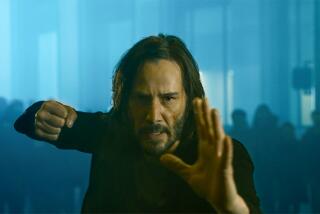Films by Chen Kaige Part of ‘New Chinese’ Program
- Share via
Chen Kaige’s superb “Farewell My Concubine” may well be the strongest contender for the best foreign film Oscar, but earlier he made, among others, two films that surprisingly are considerably more complex. They are his debut feature, “Yellow Earth” (1984), which screens Tuesday at UCLA’s Melnitz Theater, and “King of the Children” (1987), screening Sunday at Melnitz.
Both films, part of the “New Chinese Cinema” program, show the nothing-less-than-cosmic impact a newcomer has upon a remote mountain community. In the first, set in 1939 in northern China, a soldier (Wang Xueqi) has been sent to a village to collect folk songs; the idea is that if he explains that they will be sung by the Eighth Army, it will be easier to recruit village youths to join up in the battle against the Japanese invaders. What he does not reckon with is how his reports of the improving status of women in the big cities will affect a 13-year-old girl (Xue Bai) eager to free herself from an impending marriage arranged in her infancy.
Both “Yellow Earth” and “King of the Children” take place largely in single primitive locales, set against dramatic backdrops of immense mountain ranges and vast skies, yet the films possess an epic scope much like “Farewell My Concubine,” which spans half a century and covers a sizable portion of China itself. That’s because they are subtle, understated journeys into the heart, soul and mind of their people. (Note: Zhang Yimou, now a director every bit as important as Chen, served as “Yellow Earth” cameraman.)
“King of the Children” is enormously complex in its implications. Set during the Cultural Revolution, it tells of a young intellectual (Xie Yuan) who’s been undergoing “re-education” as a member of a unit that’s been ordered to work as peasants. Out of the blue he receives an order to become a teacher to a large class of children who look to be from 10 to 12 years old.
He is appalled to discover that there’s only one textbook for the entire class and that all that is expected of him is for him to write it out on a blackboard for the children to copy. He takes it upon himself, in a conscientious, patient fashion, to attempt to teach them to read and to write--and in doing so, not only how to think but also to think for themselves.
Obviously, the teacher is embarking on a dangerous course, but “King of Children,” although a warm, earthy film, is not in the least predictable or conventional. It instead evolves into a speculation on the possibilities and limitations of teaching and learning and the roles in which nature and fantasy play in those processes.
Although this film has been dissected at length as a philosophical treatise, it is nevertheless brisk, engaging, often as funny as it is sad, and finally affirmative in that no matter what happens to the teacher himself, he has transformed the lives of his students.
The 94-minute “Yellow Earth” will be preceded by Wu Wenguang’s 165-minute “My Time in the Red Guards” (1993), which screens at 7:30 p.m. and which was unavailable for preview. It is a collection of interviews with intellectuals who, in their youth, had participated in Mao Tse-tung’s political movement.
“King of the Children” is preceded by Huang Jianxin’s “Black Cannon Incident” (1985), which screens at 7 p.m. (it was shown once at UCLA in January, 1987). This prize-winning dynamic and controversial film, which ran into complicated censorship problems, takes its title from a missing chess piece referred to by a Chinese translator in a cable to an East German engineer.
Structured like a top-flight Hollywood political thriller, it is one of the most accessible and compelling contemporary Chinese pictures.
Information: (310) 206-FILM.
More to Read
Only good movies
Get the Indie Focus newsletter, Mark Olsen's weekly guide to the world of cinema.
You may occasionally receive promotional content from the Los Angeles Times.










